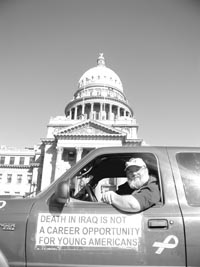
"Bottom line: My rights are very dear to me. I served my country to defend them," he says. "And one of the things I was defending was free speech. It's the First Amendment for a reason--not the last, not the middle. The first."
Dwight Scarbrough's idea of political dissent is one that rubs some people the wrong way
Red State, Meet Police State
A federal employee gets hassled by Homeland Security for antiwar stickers on his car. Is it a mistake, a new rule, or the part of a trend of the First Amendment being bullied out of existence? Read the transcript, read the rules and decide for yourself
BY NICHOLAS COLLIAS
Dwight Scarbrough's idea of political dissent is one that rubs some people the wrong way. He likes to blame his compulsion for peaceful troublemaking on his birthday: October 2, the same as Ghandi. However, a few of Scarbrough's techniques are all his own--especially when it comes to his truck.
For instance, when the Iraq War was looking imminent, not long after September 11, Dwight attached a garbage bag to the back of his truck bed. He splattered the bag and the truck with ketchup and added a sign reading, "This veteran knows that our children are worth more than a $6.95 body bag." When he drove down the freeway, the bag would inflate and appear occupied.
"That one was a little in-your-face and on-the-edge," Scarbrough recalls. "It got a lot of response."
Scarbrough wasn't always so anti-military. During the waning years of the Cold War, he even served five years on a nuclear submarine for the U.S. Navy. But now, instead of trying to stop the spread of "red" states like China and the USSR, Dwight lives in a red state--Idaho. He's the founder and head of Boise's local branch of Veterans for Peace, he leads seminars exposing military recruitment practices in schools, and he--and his truck--are fixtures at nearly every Democratic, antiwar or pro-peace event in town.
While no longer smeared with ketchup, his ride is still hard to ignore. On the back, he tapes weekly updates of the number of U.S. soldiers killed and wounded in Iraq. Beneath that, on a large, white (and also taped-on) placard: "Support our returning troops and their families when they need help: Give them this number: GI RIGHTS HOTLINE: 1-800-394-9544." On both doors, in bold capital letters: "DEATH IN IRAQ IS NOT A CAREER OPPORTUNITY FOR YOUNG AMERICANS." Taking up nearly half of the back window: "Veterans for Peace Chapter 117, Idaho." On the driver's side wheel well, also in all caps: "PERHAPS GOD BLESSES EVERY NATION, NOT JUST THE USA." And interspersed between them all, he places a variety of purchased bumper stickers and magnetic ribbons reading, among other sentiments, "Support our Troops: Bring them Home Now," "Support Diversity" and "Honor Vets, Wage Peace."
Scarbrough gets his share of negative attention--including plenty of people "flying the bald eagle," as he likes to call it--but he savors such attention. He likes to call his truck a "sociological experiment on wheels," and whether you like the message of that experiment or not, it's hard to avoid the conclusion that Scarbrough is the type of extreme voice that the First Amendment--that one about free speech--is intended to protect.
Or at least it seemed that way until last Tuesday.
On February 7, Scarbrough went to his job like any other day. He is a scientist with a federal agency in Boise--one that is part of the executive branch, ironically--and he parked in his usual spot, just outside of the federal Natural Resource Center on Vinnell Way in Boise, kitty corner to a Wal-Mart, a Lowe's Home Improvement Center and a 21-screen Edwards cineplex. Made up of two large, square brick buildings, the complex houses a variety of federal offices including the Social Security Administration, the Bureau of Land Management, the U.S. Fish and Wildlife Service and the Immigration and Naturalization Service, among others. But despite the fact that most of the employees in the complex can, at least officially, consider George W. Bush their boss, Scarbrough has taken remarkably little grief for his strident anti-Bush views and props. Even those who don't agree with his message usually tolerate it.
Once, last year, some conservative-minded ladies objected about the "BUSHIT" sticker in Scarbrough's passenger-side window. Scarbrough and his supervisor reviewed all the federal rules concerning bumper stickers on employee vehicles, and discovered that nothing he had displayed could be considered illegal. But for once, Scarbrough simply removed the sticker. Indeed, his current lineup is quite sparse by his standards, he says.
But on this day, apparently it was still too much.
Around 2:15 p.m., Scarbrough says, he answered his office phone and found himself talking to a man who identified himself as Officer R. of the Department of Homeland Security. (I'm withholding the officer's name; you know, what with Plamegate and all.) Scarbrough was told that he was in violation of the Code of Federal Regulations, the set of rules that govern all executive departments and agencies, and that he was in danger of being cited unless he came out to the parking lot or let the officer come up to his office. Scarbrough chose the first option, and took along a co-worker--also a veteran--and, being an experienced peace activist, a tape recorder. Downstairs, they found two armed officers with "Homeland Security" insignia patches on their shoulders, waiting for them in large white SUVs. Scarbrough informed the officers that he would record their conversation, and what follows is the transcript of that recording.
Officer: Step back here please.
Dwight Scarbrough: Let's have a seat.
O: I'd like to talk to you.
DS: Let's have a seat.
O: Sir, come over here please.
DS: I don't want to come over there. I want to sit down.
O: Let me tell you what's going on here. OK, there's a violation of the code of federal regulations.
DS: For what?
O: The CFR. 41, CFR, 102, 74, 415. Posting or affixing signs, pamphlets, handbills or flyers on federal property. Do you understand that?
DS: I'm not doing anything on federal property.
O: Yes, sir, you've got signs posted on your vehicle. I'm informing you that you're in violation.
DS: That's not illegal. That's not illegal.
O: You're posting ...
DS: I ... All right.
O: Would you like to listen to me before ... sir...
DS: [To his co-worker] Would you go get [their supervisor]?
O: I need you to listen when I'm talking, sir.
DS: [To co-worker]. Would you go get [him] please? [To officer] I'm listening.
O: Okay.
DS: You're at my place of work, first of all. And you're harassing me.
O: Sir, you're in violation of the code of federal regulations.
DS: I'm not in violation.
O: You're posting signs on this property.
DS: I am not posting signs. That's on a private vehicle.
O: Sir, I'm here to tell you now that you have to remove those signs.
DS: Was the law just changed?
O: No, there was no law just changed.
DS: Then it's not a violation.
O: I just told you what the law is, sir.
DS: It is not a violation. I've read the statutes already.
O: If you do not comply with my order to remove the signs from the property, I will cite you for it, OK? Do you understand that?
DS: You know what? This is harassment.
O: No, sir, it's not.
DS: Yes, it is.
O: No, it's not.
DS: Say it again, please. (Holds up microphone.) This is harassment.
O: Do you understand what I've told you?
DS: I understand what you've told me, but I've also read the statute that as a federal employee--
O: I've just given you an order and told you to remove those signs from the property.
DS: I will move my vehicle off the property.
O: That will be fine. That will comply with it, and we don't have to ...
DS: You know this is total B.S., though. Because--will you get [his supervisor], please?--I've already had this conversation once, and we've already looked up all the statues and laws covering personal vehicles with stick ... with anything on them on government property. And it is not illegal.
O: It's in 41 CFR. Look that up.
D: "Why don't you look it up?" I have.
O: 41 CF4 102--
D: What is the violation?
O: Posting of signs on--
D: Which one?
O: I just told you the violation.
D: Those are not signs.
O: Twice now I've told you.
D: Those are not signs.
O: Yes, sir, they are. What are they then?
D: So any vehicle that comes on with, like, a police sign, or with delivery or FedEx or something, that's not a sign?
O: All signs are prohibited--
D: You know you're harassing me. You know you're harassing me.
O: No, sir, I'm not.
D: You know the Department of Homeland Security is giving me harassment--
O: Sir--
D: --because I'm a person who happens to express my viewpoints on my vehicle.
O: I need you to comply with my order and remove the signs...
D: Who has filed a complaint?
O: ...you said you'd do that, that's fine ...
D: Who has filed a complaint? Who has filed a complaint?
O: No one has filed a complaint, sir.
D: Well, then what's the complaint?
O: It's law enforcement on federal property.
D: You know this is ... I would like my supervisor down here, please.
O: This doesn't concern him at all.
D: Yes, it does, because I've already had this discussion with him, and I've already been asked to change the signs, and I did. And I looked up all the statutes.
O: (Muffled)
D: Do you have a piece of paper with the number then, please?
O: I told you the number.
D: I would like to write it down, then.
O: I will give you a piece of paper ...
D: Just write it down. That's all I'm asking.
O: But I need you to comply with my instructions to remove the--
D: You're harassing me, in other words.
O: Sir, this is not harassment.
D: It's crap, and you know it.
O: No, sir, it is not.
D: It is. Okay, go ahead.
O: 41, C-F-R...
D: 41, C-F-R...
O: 102 ...
D: 102 ...
O: 74 ...
D: 74 ...
O: Subpart C ...
D: Subpart C ...
O: Paragraph 415.
D: Paragraph 415.
O: And they are posted at the entrances to federal facilities, as they are here, and it is referenced.
D: And this defines exactly what "signs" are, right?
O: It says "signs," sir.
D: Yeah. You're harassing me. I'll be back in a minute. I don't have my keys with me.
O: Sir--
D: I don't have my car keys with me.
O: Okay.
D: I had no clue what you were here to bother me about ... (walks toward door)... this is your buddy, your boss and my boss harassing people for expressing political viewpoints. And you know it. There's nothing illegal about it. (Door beeps).
Scarbrough moved his car to the parking lot in front of a nearby Goodwill store, a private property where it could legally be towed if the managers objected to his decorations. It wasn't towed, but according to his co-worker, Scarbrough was still "very distraught"--both by the accusations and by the way the officers maneuvered themselves between Scarbrough and his coworker, isolating them in a classic police crowd-control technique.
"I wasn't arrested, but I could have been," Scarbrough recalls. "I was still violated and harassed." He took the rest of the week off after the incident. But he didn't just sit and mope. He looked up the rule that the Homeland Security officers referenced, and found that it read:
"All persons entering in or on Federal property are prohibited from: ...
(b) Posting or affixing materials, such as pamphlets, handbills, or flyers, on bulletin boards or elsewhere on GSA-controlled property..."
However, after his experience with the "Bushit" sticker last year, he was also quick to reference the Hatch Act, the rules that lay out exactly what political activities federal employees are allowed to participate in. According to the Hatch Act, political bumper stickers are allowed on cars parked on federal property, with no stated limitation on either size or number of stickers. So by the current rules, Scarbrough's car would seem to be legit--unless the "elsewhere" of the pamphlet rule is meant to extend to personal property as well as government property.
If that's the case, both Scarbrough and his coworker said, "That's news to me." It would also be news to the dozens of people parked in the Natural Resource Complex with bumper stickers reading, among other sentiments, "My Dad is a Marine," "Create Peace," "POW/ MIA," and others of both the pro-choice and pro-life variety.
But after going through the incident, both Scarbrough and his coworker are insistent: it's not the location or size that mattered in this case. It's the message. They are quick to relate the event to Cindy Sheehan being arrested at President Bush's State of the Union address just a week earlier, where she was wearing a T-shirt reading: "2245 Dead. How many more?" Sheehan's charges were dropped, and Capitol Police Chief Terrance Gainer apologized to her in a statement, saying "The policies and procedures were too vague."
Scarbrough's co-worker doesn't see any vagueness in the incidents. "It's starting to look like this is something like a directive from the Department of Homeland Security to suppress opposition to the war," he says. He calls the officers "image control," but Scarbrough's take is even more forceful:
"This is a fascist state. At least, it's the beginning of a fascist state."
If you're unfamiliar with the Boise office of the Federal Department of Homeland Security, you're not alone. There's not a listing for it in the most recent federal government listings in the local phonebook. The representative from Idaho State Bureau of Homeland Security, located at the Gowen Field Air National Guard Base behind the Boise Airport, hadn't even heard there was an office when I contacted him. Neither had the receptionist at the local U.S. Marshal's office, though she was able to track down a number for the local office of the Federal Protective Service, the section of DHS in charge of protecting federally owned and leased facilities, after putting me on hold for a few minutes (It's (208) 334-9374, in case you're curious. Your taxes fund it, after all.).
I was only able to confirm the location of the office after asking the security officer at the Natural Resource Complex, whose job (ostensibly, at least) it is to enforce the rules concerning pamphlets, dogs and other controlled substances on federal property. He would not comment about the incident, saying, "If this is about what I think it's about, I'm not allowed to say nothing." He referred me to "FPS, Federal Courthouse, Department of Homeland Security," to find someone who would be able to comment. When I asked who I should say referred me, he covered his nameplate with his hand.
The "office," once I found it, wasn't much of an office at all, from a service perspective. The door was locked and there was neither a receptionist nor a desk at the front window. When I rang the doorbell, a woman emerged from a nearby cubicle and spoke to me through a tennis-ball-sized hole in the window. She would not confirm the name or identity of the officers, nor their badge numbers (Scarbrough, of course, had written them all down). I slipped a business card through the hole, and by press time, no one had called me back.
However, when I tried the number provided by the U.S. Marshals, Terry Martin at the Federal Protection Service was able to confirm that the officers identified by Scarbrough did, in fact, work for Homeland Security. He then referred me to the Department of Homeland Security's media spokesman in Texas, who had not responded by press time to my request for information about the incident, or about any change in federal law concerning stickers on vehicles in federal parking lots.
In the meantime, Scarbrough has gone back to work and says he plans to continue parking in the same spot. But now he has an ally. After the incident, he contacted the local office of the American Civil Liberties Union. The ACLU helped hook him up to a local lawyer who will represent Scarbrough, pro bono, if he is cited. Several other lawyers have already made similar offers, Scarbrough says. But that doesn't make him feel any better about the incident or the message it sends, not only to dissenters like him, but to all federal employees and anyone who thinks their opinions--or their stickers--are only of concern to themselves.
"Bottom line: My rights are very dear to me. I served my country to defend them," he says. "And one of the things I was defending was free speech. It's the First Amendment for a reason--not the last, not the middle. The first."














